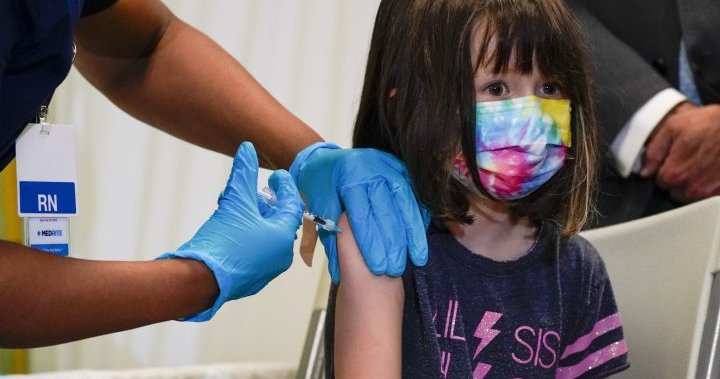Saskatchewan government data show children from the age of one to four visit emergency rooms with COVID-19-like symptoms nearly two and a half times more than the provincial average.
And the rate for young children is going up.
According to the latest COVID-19 data update, 72.6 per 1,000 children between the ages of one and four years visit ERs with COVID-19 symptoms compared to just 27.1 for the entire population, as of March 12th.
Read more:
BA.2 could mean new COVID-19 wave: scientists
Children aged five to 11 attend at a rate of 30.7 per 1,000 people.
And while the rate for the entire population has been declining since the province began issuing provincial reports in early February, the rate for young children has risen in the last three weeks, from 64.9 on 26 February.
The story continues below the ad
Dr Adam Ogieglo, a family physician in Saskatoon, told Global News that he has consistently seen more children with COVID-19 symptoms in his practice since the provincial government lifted the mask mandate in early March.
“So, kids under five (have) a lot of crepe-like presentations, or kids have a little trouble breathing, need a little medicine to help them get through that,” he said.
Usually – at least, before the pandemic – he said he would see a decline in cold and flu issues this time of year.
Looking at the list of walking patients during the interview, he said a quarter of them were younger than 12 and had COVID-like symptoms.
He also said he also saw an increase in long-term COVID-type symptoms, where they had coughs, drowsiness and difficulty breathing for months.
“(Long-term effects are) what I worry about,” he told Global News.
“The let-it-rip approach we take is – what if it’s something we see with other viruses, associated with problems later in life, such as how chickenpox gives you belts? And there has been a link between the Epstein- Barr virus that causes mono and multiple sclerosis, “he said.
Pro-public health rallies for COVID-19 mandates
The story continues below the ad
The problem of prolonged COVID and the risk of becoming infected is worse for children than the general population because those between five and 12 are not yet eligible for a vaccination booster – which helps prevent an Omicron infection from becoming more serious – and because the Canada Public Health Agency has not approved a vaccine for use on anyone under five years of age.
Trending stories
-
How a single company “quietly” took over the world of visa processing in an age of record migration
-
BC father spreads love, acceptance after only 1 child has his son’s birthday
When asked if he had a sense of where the virus was spreading, Ogieglo said it was everywhere.
Martensville parent Dorinda Thompson believes her eight-year-old son, Decker, caught it either playing hockey or at a friend’s birthday party.
“Is it soft? Will it be – will he stay in the hospital?” She said, recalling her reaction to Decker’s test was positive.
Read more:
COVID-19 vaccination: Second-dose delay ‘more risky’ for seniors, experts warn
“That was my biggest fear“.
Thompson said they always wear masks and only interact with the same people.
She told Global News that four people from her son’s friend group or in his hockey team caught COVID-19 at the same time, which suddenly increased the total number of people they knew with the disease to eight.
The story continues below the ad
“Those are the most people I know who have started COVID since the whole pandemic,” she said.
Decker never needs to go to the hospital. But even with his full recovery (and temporary immunity from COVID’s contracts), Thompson said she is still concerned about the amount of the virus in the population and the potential emergence of new variants.
Ogieglo said more tests, particularly PCR tests, would help the medical community and scientists know what was going on with the virus and help the general population be aware.
NDP leader Ryan Meili raised the issue again in the question period on Tuesday.
“It made zero sense to always delete the general access to PCR testing. It made zero sense to delete regular reporting. It makes even less sense than we might go into a BA.2 wave. We do not know what that will look like. , but the problem is that we know so much later because we do not even have access to the tests, “he said.
Prime Minister Scott Moe and Health Minister Paul Merriman defended the move, emphasizing Saskatchewan’s early admission to rapid test kits and suggesting that serious COVID-19 cases in children lead doctors to order PCR tests.
Read more:
Saskatchewan opposition wants PCR COVID-19 tests for children 5 and under
The story continues below the ad
Ogieglo said he does, but said more information makes it easier to understand how the virus spreads, especially since PCR tests are much more sensitive than fast antigen tests.
“If you test in the first few days (to have symptoms with a fast antigen test), there are high rates of false negatives, which means you are wrongly reassured that you potentially have no COVID where you could have COVID,” he says. sot.
“And even if you do not have COVID, you are spreading around potentially other germs that other people need to isolate.”
He also said it would help if the provincial government “acts on information and data instead of trying to make some political decisions”.
He said the government should re-implement public health regulations if the virus spreads rapidly and if many people get sick – as now.
– with files by Connor O’Donovan
© 2022 Global News, a division of Corus Entertainment Inc.


Add Comment